

Nick Bostrom. Alhazen. Alhazen is regarded to be the first theoretical physicist and he has been the earliest to discover that a hypothesis has the necessity to be experimented through confirmable procedures or mathematical evidence, hence developing the scientific method 200 years before it was approved by Renaissance scientists.[11] In medieval Europe, he was honored as Ptolemaeus Secundus ("Ptolemy the Second")[12] or simply called "The Physicist".[13] He is also sometimes called al-Basri (Arabic: البصري) after Basra, his birthplace.[14] He spent most of his life close to the court of the Fatimid Caliphate in Cairo and earned his living authoring various treatises and tutoring members of the nobilities.[15] Overview[edit] Biography[edit] Ibn al-Haytham (Alhazen) was born c. 965 in Basra, which was then part of the Buyid emirate,[1] to an Arab family.[16][17]
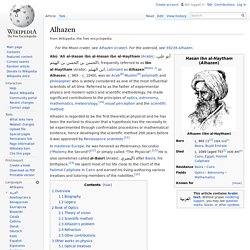
Mozi. Name[edit] There has been considerable debate about the actual name of Mozi, not less than three concepts of its origin exist as of the date. 1.
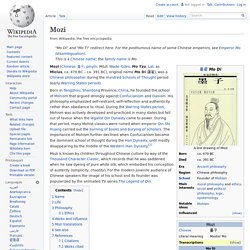
Traditionally, Mozi was said to have inherited the surname "Mo" from his supposed ancestor, the Lord of Guzhu (Chinese: 孤竹君; pinyin: Gūzhú Jūn), himself descended from Shennong, the legendary emperor. The descendants of the Lord of Guzhu had the clan name "Motai" (Chinese: 墨胎; pinyin: Mòtāi), which later was shortened to "Mo". 73 Mind-Blowing Terence Mckenna Quotes. Voltaire.
French writer, historian and philosopher.
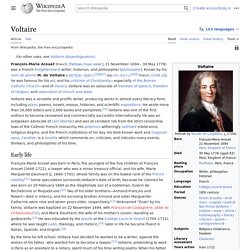
Jacques Derrida. Jacques Derrida (/ʒɑːk ˈdɛrɨdə/; French: [ʒak dɛʁida]; born Jackie Élie Derrida;[1] July 15, 1930 – October 9, 2004) was a French philosopher, born in French Algeria.
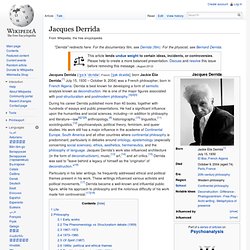
Derrida is best known for developing a form of semiotic analysis known as deconstruction. He is one of the major figures associated with post-structuralism and postmodern philosophy.[3][4][5] During his career Derrida published more than 40 books, together with hundreds of essays and public presentations. He had a significant influence upon the humanities and social sciences, including—in addition to philosophy and literature—law[6][7][8] anthropology,[9] historiography,[10] linguistics,[11] sociolinguistics,[12] psychoanalysis, political theory, feminism, and queer studies. Particularly in his later writings, he frequently addressed ethical and political themes present in his work. Life[edit] Derrida was the third of five children.
Derrida traveled widely and held a series of visiting and permanent positions. Socrates. Socrates (/ˈsɒkrətiːz/;[2] Greek: Σωκράτης [sɔːkrátɛːs], Sōkrátēs; 470/469 – 399 BC)[1] was a classical Greek (Athenian) philosopher credited as one of the founders of Western philosophy.
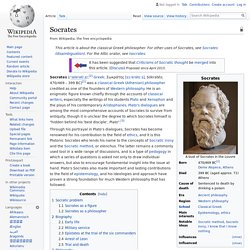
He is an enigmatic figure known chiefly through the accounts of classical writers, especially the writings of his students Plato and Xenophon and the plays of his contemporary Aristophanes. Plato's dialogues are among the most comprehensive accounts of Socrates to survive from antiquity, though it is unclear the degree to which Socrates himself is "hidden behind his 'best disciple', Plato".[3] Through his portrayal in Plato's dialogues, Socrates has become renowned for his contribution to the field of ethics, and it is this Platonic Socrates who lends his name to the concepts of Socratic irony and the Socratic method, or elenchus.
Socratic problem Nothing written by Socrates remains extant. Socrates as a figure Socrates as a philosopher Biography Early life Military service. Islamic philosophy. Al-Kindi. Abu Yūsuf Yaʻqūb ibn ʼIsḥāq aṣ-Ṣabbāḥ al-Kindī (Arabic: أبو يوسف يعقوب بن إسحاق الصبّاح الكندي, Latin: Alkindus) (c. 801–873 CE), known as "the Philosopher of the Arabs", was an Iraqi Muslim Arab philosopher, mathematician, physician, and musician.
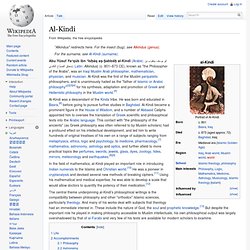
Al-Kindi was the first of the Muslim peripatetic philosophers, and is unanimously hailed as the "father of Islamic or Arabic philosophy"[2][3][4] for his synthesis, adaptation and promotion of Greek and Hellenistic philosophy in the Muslim world.[5] Al-Kindi was a descendant of the Kinda tribe. He was born and educated in Basra,[6] before going to pursue further studies in Baghdad. Al-Kindi. First published Fri Dec 1, 2006; substantive revision Wed Jan 26, 2011 Abu Yusuf Ya‘qub ibn Ishaq Al-Kindi (ca. 800–870 CE) was the first self-identified philosopher in the Arabic tradition.
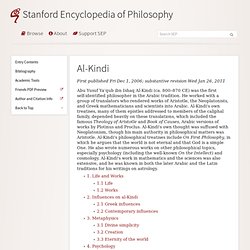
Ludwig Wittgenstein. Ludwig Josef Johann Wittgenstein (26 April 1889 – 29 April 1951) was an Austrian-British philosopher who worked primarily in logic, the philosophy of mathematics, the philosophy of mind, and the philosophy of language.[4] From 1939–1947, Wittgenstein taught at the University of Cambridge.[5] During his lifetime he published just one slim book, the 75-page Tractatus Logico-Philosophicus (1921), one article, one book review and a children's dictionary.[6] His voluminous manuscripts were edited and published posthumously.
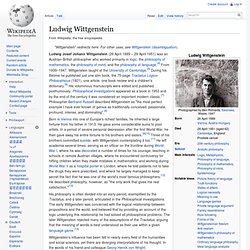
Philosophical Investigations appeared as a book in 1953 and by the end of the century it was considered an important modern classic.[7] Philosopher Bertrand Russell described Wittgenstein as "the most perfect example I have ever known of genius as traditionally conceived; passionate, profound, intense, and dominating".[8] Born in Vienna into one of Europe's richest families, he inherited a large fortune from his father in 1913. Philosophical Investigations. Philosophical Investigations (Philosophische Untersuchungen) is a highly influential work by the 20th-century philosopher Ludwig Wittgenstein.
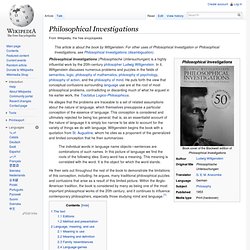
In it, Wittgenstein discusses numerous problems and puzzles in the fields of semantics, logic, philosophy of mathematics, philosophy of psychology, philosophy of action, and the philosophy of mind. He puts forth the view that conceptual confusions surrounding language use are at the root of most philosophical problems, contradicting or discarding much of what he argued in his earlier work, the Tractatus Logico-Philosophicus. He alleges that the problems are traceable to a set of related assumptions about the nature of language, which themselves presuppose a particular conception of the essence of language.
This conception is considered and ultimately rejected for being too general; that is, as an essentialist account of the nature of language it is simply too narrow to be able to account for the variety of things we do with language.